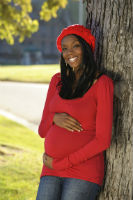How to Reduce Swelling During Pregnancy
You can expect to experience swelling during pregnancy. Although it is difficult to avoid it altogether, there are ways to reduce it and give your body some relief. Try these tips to reduce swelling.
Tips to Avoid Swelling
Normal swelling during pregnancy can be a nuisance and contribute to fatigue at the end of the day, especially tired legs and feet. Try these tips:
- Avoid standing or sitting for long periods of time. If you need to stand or sit for more than an hour at a stretch and exercise your legs and feet. Don't cross your legs when you sit, as this can restrict circulation in your legs.
- Elevate swollen feet for an hour, especially at the end of the day; this should diminish swelling during pregnancy a bit.
- Relax in a rocking chair while flexing your feet against a footstool. This movement promotes circulation in your legs. A rocking chair will be on your "must have" list for when the baby arrives, so you might as well get it now and start enjoying it.
- Walk, swim or ride a stationary bike. All three are excellent for increasing circulation to your arms and legs.
- Avoid sleeping on your back. Sleeping on your side takes the pressure of your weighty uterus off the major blood vessels and promotes better blood return from your legs.
- Wear loose clothing. Avoid tight bands on pants, socks or any other clothing as they can restrict circulation.
- Elevate your feet on a stool during the day and on a pillow at night.
- Elevate your hands when sitting.
- Enjoy a healthy diet. Drink at least eight 8-ounce glasses of liquid daily, especially in hot, humid weather.

Get Plenty of Salt and Fluids
Make sure that you have adequate amounts of protein in your diet, and use salt to taste.
Do not go on a fluid- or salt-restricted diet unless your healthcare provider advises because you have a specific medical indication. Drinking less fluid will not alleviate the swelling, and your body needs salt for a healthy pregnancy.
To check if you are drinking enough water each day, notice the color of your urine.
If your urine is almost colorless or slightly yellow, chances are you are drinking enough fluid. If your urine is concentrated to a darker color, like apple juice, this may be a sign of under hydration.

